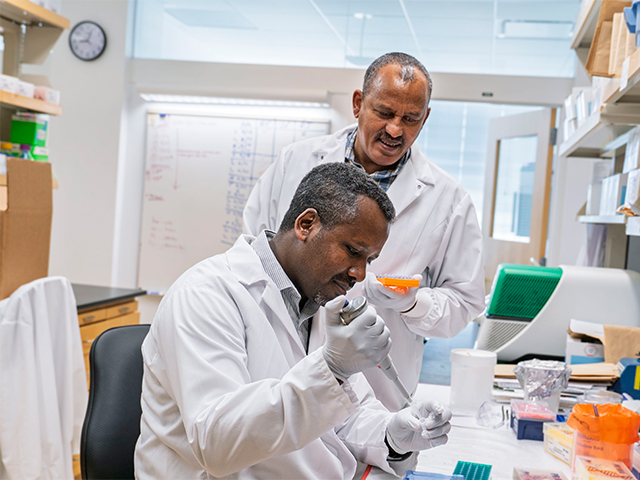Building Capacity: Advanced Training to Improve Tef Productivity
Long before he became a plant biologist studying crop improvement at the Danforth Center, Ibsa Merga was learning about agriculture as a child growing up on his family’s farm in the countryside of Ethiopia. Farming is the backbone of the local community there, and Merga spent his early years working with the plants his family grew.
“Growing up, I was actively involved in managing various crops alongside my family, which gave me a firsthand understanding of the vital role plants play in sustaining livelihoods,” Merga shared. “This early exposure sparked my curiosity and passion for agriculture.”
That early interest in plant science only grew, inspiring Merga to pursue an education in plant science, and later, to join the Ethiopian Institute of Agricultural Research, where he worked on innovative projects to enhance crops for food security. Now, he’s working on the Genome Editing in Tef for Uplifting Productivity (GET-UP) project, the initiative that brought him here to St. Louis.

Ibsa Merga (foreground) trains at the Danforth Center under Getu Duguma, PhD, (background) as part of the GET-UP project, which aims to deliver high-yield, climate-resilient varieties of tef to smallholder farmers in Ethiopia.
Training for the Future of Tef
The GET-UP project is an international collaboration between the Ethiopian Institute of Agricultural Research and the Danforth Center’s Institute for International Crop Improvement. GET-UP’s focus is on tef, a highly adaptable cereal crop that plays a vital role in Ethiopian cuisine, food security, and economic stability. The project’s goal is to use advanced breeding techniques to deliver high-yield, climate-resilient varieties of tef to smallholder farmers in Ethiopia, empowering them to support themselves and their communities.
In January, Merga arrived at the Danforth Center as part of the project. Here, he is immersing himself in six months of intensive training under Getu Duguma, PhD, senior research scientist & principal investigator. Merga noted that collaborating with scientists from different backgrounds has further expanded his versatility as a scientist, shaping him into an even better collaborator. He is actively involved in the project’s ongoing activities and is gaining experience across a diverse set of specialized skills. These include designing gene constructs for targeted gene editing, tef transformation, regeneration, trait evaluation, and characterization of transformed plant lines.
Growing Expertise on Tef’s Home Turf
The hands-on experience has not only deepened Merga’s already impressive understanding of CRISPR-based genome editing; it has also equipped him with valuable knowledge that will play a crucial role in driving global food security efforts.
Upon completing his training, Merga will return to the Ethiopian Institute of Agricultural Research, where he will share the expertise he has gained with his colleagues. The ultimate goal of his time at the Danforth Center is to help build capacity in Ethiopia, empowering local researchers to carry out this specialized, highly skilled work on tef at home in the plant’s native environment.
“I would like to thank the GET-UP project PIs, the Danforth Center, and the Gates Foundation for the opportunity,” Merga said. “My experiences have reinforced my belief in the critical importance of plant science in addressing global challenges such as food scarcity and agricultural sustainability.”